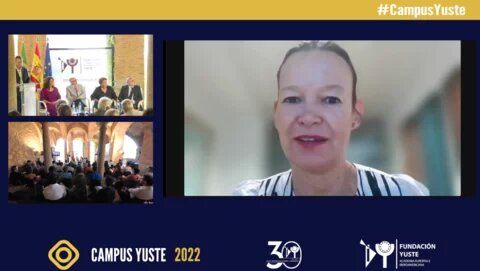
The EU-LAC Foundation was present at the inauguration of the course 'The challenge of working together: European Union-Latin America and the Caribbean relations in the face of major global challenges' of Campus Yuste. The objective of the course is to analyse, from a multilateralism perspective, the current context in the European Union-Latin America and the Caribbean relations and face the challenges at a global level to which bi-regional relations can contribute.
In her speech, President Leire Pajín highlighted the necessary cooperation between the European Union and Latin America and the Caribbean to weave a common road map in the multilateral sphere and find the appropriate mechanisms together with actors in both regions that can face the global challenges. She also reiterated the firm commitment of the Foundation to continue promoting the transatlantic view, sharing information and strategy and forging joint relationships with actors in both regions, making spaces available to build together.
Director Bonilla underlined the consensus and commitment of both regions to fundamental global issues such as the SDGs, gender equality, energy transition, health, sustainable recovery, democracy, and digitization, among others. He also highlighted the necessary bi-regional cooperation and suggested the reactivation of the EU-LAC political dialogue in a plural environment, with a proactive and cooperative nature, in which complementarities are sought to address current geopolitical challenges.
The general director of External Action of the Junta de Extremadura and president of the Executive Commission of the Yuste Foundation, Rosa Balas Torres, vindicated multilateralism as a measure to face the challenges that the world has to face today. Referring to the words of the former president of Costa Rica, Óscar Arias, when he received the Nobel Peace Prize in 1987, “only peace can write a new history”, the director-general of External Action of the Regional Government of Extremadura said in her opinion, the world has been forced to define a new order and a new geopolitical map with the crisis we are experiencing as a result of Russia’s invasion of Ukraine, “which has shown that this, together with the pandemic of the coronavirus, has pointed out that unilateralism is not valid and that we are all connected”.
The Secretary of State for Ibero-America and the Caribbean and Spanish in the World of the Spanish Government, Juan Fernández Trigo, affirmed that, in his opinion, we will be Euro-compatible “if Latin America aspires to have higher welfare standards, better tax systems and social protection systems, as well as greater regional integration in order to achieve better trade relations”. He also pointed out that another obstacle is the massive migration from Latin America to Spain, although he explained that “in order for our economic systems to work we need immigration, but it has to be an orderly one”.
During the inauguration, the head of International Relations of the Ibero-American General Secretariat and patron of the Yuste Foundation, María Salvadora Ortíz, also spoke, stating that this course responded to the intergenerational challenge that lies ahead because it brings together politicians, academics and experts with young thus producing an “intergenerational dialogue”.
This course, included in Yuste Foundation’s training programme Campus Yuste, and which is also part of the University of Extremadura’s International Summer Courses, counts on the sponsorship of MAFRESA and the collaboration of the Ibero-American General Secretariat (SEGIB), Euroamérica Foundation, the Regional Government of Extremadura, National Heritage and the provincial councils of Cáceres and Badajoz.